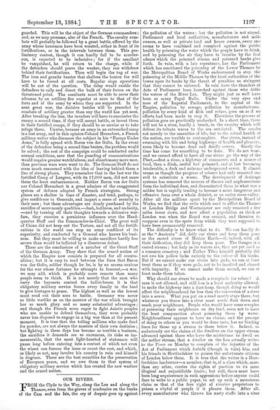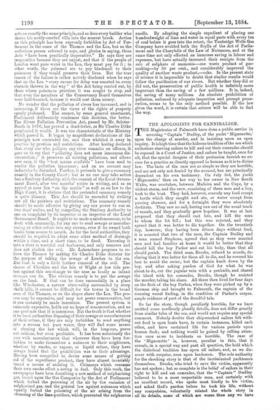OUR RIVERS.
FROM the Clyde to the Wey, along the Lea and along the Thames, even from the groves of academies on the banks of the Cam and the Isis, the cry of despair goes up against the pollution of the waters ; but the pollution is not stayed. Parliament and local authorities, manufacturers and mill- owners, as well as private land and house owners, every one seems to have combined and conspired against the public health by poisoning the water which the people have to drink, and by poisoning the air they have to breathe by the foul odours which the poisoned stream and poisoned banks give forth. In vain, with a late repentance, has the Parliament which has sanctioned the poisoning of the Lower Thames by the Metropolitan Board of Works endeavoured to stop the poisoning of the Middle Thames by the local authorities of the towns upon its banks by the threat of penalties so stringent that they cannot be enforced. In vain have the thunders of Acts of Parliament been launched against those who defile the waters of the River Lea. They might just as well have been so many Papal Bulls. Under the very eyes and nose of the Imperial Parliament, in the capital of the Empire, pollution by sewage, pollution by manufactures, pollution by every kind of filth and refuse, goes on as if no efforts had been made to stop it. Elsewhere the process of pollution goes on practically unchecked. In a short time, there will not be a river, hardly a brook, in the country which will deliver its tribute waves to the sea untainted. The results not merely to the amenities of life, but to the actual health of the nation, are terrible to contemplate. Our rivers, instead of swarming with life and being highways of health and pleasure, seem likely to become dead and deadly sewers. Surely the time has come for something to be done. We do not want,
and we cannot afford to have all our rivers go the way of the Fleet,—first a river, a highway of commerce, and a source of food, then a ditoh, useful but poisoned, and at last becoming intolerable, a dark and noisome underground sewer. It almost seems as though the progress of science had only removed one evil to substitute a worse. The development of drainage systems has removed the sources of disease and unpleasantness from the individual door, and disseminated them in what was a milder but is rapidly tending to become a more dangerous and offensive form over a whole district, or an entire river-valley. After all the millions spent by the Metropolitan Board of Works, we find that the evils which used to afflict the Thames at London Bridge ind Westminster are only removed a few miles lower down, and now affect a population as thick as London was when the Board was created, and threaten to reappear even in the spots from which they were supposed to have been permanently removed.
The difficulty is to know what to da. We can hardly do as the "Ancients" did, deify our rivers and keep them pure as the sacred rivers of Mother Earth—if, indeed, with all their deification, they did keep them pure. The Ganges is a sacred stream ; but holy as its waters are, they are yet used as a common cemetery ; and Father Tiber himself probably did not owe his yellow locks entirely to the colour of his banks. But if we cannot make our rivers into gods, we can at least treat them as if they were gods, not to be insulted and abused with impunity. If we cannot make them sacred, we can at least make them taboo.
Why should our rivers be made a receptacle for refuse? A man is not allowed, and still less is a local authority allowed, to make the highway into a dust-heap, though doing so would affect the neighbourhood far less than the conversion of a river into a sewer. What you put on a road mostly stays there, but whatever you throw into a river must needs float down and reach your neighbours. People who would have some scruples at poisoning their neighbours on dry land, seem not to have the least compunction about poisoning them by water. Neighbourliness appears to have no claims, and the precept of doing to others as you would be done unto, has no binding force for those up a stream to those below it. Indeed, so audaciously are the claims of the dwellers on the upper stream advanced against those who have the misfortune to dwell on the nether stream, that a dweller on the Lea actually writes to the Times on Monday to complain of the injustice of the Act of Parliament which forbids (though in vain) him and his friends in Hertfordshire to poison the unfortunate citizens of London below them. It is true that the writer is a Hert- fordshire landowner—a member, that is, of a class which, more than any other, carries the rights of position to its 111013t illogical and unjustifiable limits ; but still, there must have been long acquiescence in such aggressions before anyone could dare to write to a public paper, to set up such a monstrous claim as that of the free right of riverine proprietors to poison a cityful of people if it pleases them. After all, every manufacturer who throws his nasty stuffs into a river
acts on exactly the same principle, and so does every builder who drains his newly-erected villa into the nearest brook. Action on this principle has been expressly forbidden by Act of Par- liament in the cases of the Thames and the Lea, but as the audacious person referred to says, and glories in saying, these Acts "have been practically inoperative." He says they are inoperative because they are unjust, and that if the people of London want pure water in the Lea, they must pay for it ; in other words, the poisoned are to pay blackmail to their poisoners if they would preserve their lives. But the true reason of the failure is rather naively disclosed when he says that on the Lea "every excuse for delay was resorted to, every obstacle thrown in the way" of the Act being carried out, by those whose poisonous practices it was sought to stop, and that even the members of the Conservancy Board themselves were half-hearted, because it would cost them money.
No wonder that the pollution of rivers has increased, and is increasing, if these are the views of the rights of property openly professed. The sooner, by some general enactment, Parliament deliberately condemns this doctrine, the better. The Rivers Pollution Prevention Act, passed by Mr. &later- Booth in 1876, has proved a dead-letter, as Sir Charles Dilke prophesied it would. It was too characteristic of the Ministry which passed it. It began by magnificent declarations of the principle now contended for, and then whittled it away in practice by provisos and restrictions. After having declared that every one who pollutes any river commits an offence, it goes on to say that "polluting does not mean innocuous dis- colouration ;" it preserves all existing pollutions, and allows new ones, if the "best means available" have been used to render the pollution innocuous ; and on no account may industries be disturbed. Further, it pretends to give a summary remedy in the County Court ; but as no one may take action but a Sanitary Authority, with the consent of the Local Govern- ment Board, after two months' notice in writing, and as an appeal at once lies "on the merits" as well as on law to the High Court, it is obvious that the pretended summary remedy is quite illusory. This Act should be amended by striking out all the provisos and restrictions. The summary remedy should be made effective by giving any one power to sue on two days' notice, and by compelling the Sanitary Authority to sue on complaint by its inspector or an inspector of the Local Government Board. It ought to be made a misdemeanour, to be dealt with summarily, for any one to send sewage or manufac- turing or other refuse into any stream, even if he owned both banks from source to mouth. As for the local authorities, they should be required to adopt some other method of drainage within a time, and a short time, to be fixed. Throwing it into a river is wasteful and barbarous, and only removes and does not abolish the evil. Mr. Labouchere proposes to re- lieve the Thames by making Sir Charles Dilke dictator for the purpose of taking the sewage of London to the sea. But that is only a little further removal of the evil. The shores of Cheshire and the Isle of Wight at low tide pro- test against this sea.change to the nose as loudly as inland streams can do. The obvious remedy is to put the sewage on the land. If that can be done successfully in a place like Winchester, a narrow river-valley surrounded by steep chalk hills, it cannot be difficult for the towns in the broad area of the Thames, or on the slopes above the Lea. The pro- cess may be expensive, and may not prove remunerative, but it can certainly be made innoxious. The present system is ruinously expensive, holds out no hope of remuneration, and no one pretends that it is innoxious. But the truth is that whether it be local authorities disposing of their sewage or manufacturers of their refuse, if they are only forbidden to send anything into a stream but pure water, they will find some means of obeying the law which will, in the long-run, prove not ruinous, but even profitable. It has been notoriously the case with manufacturers that wherever they have been for- bidden to make themselves a nuisaa ce to their neighbours, whether by smoke, or vapour, or liquid refuse, they have always found that the prohibition was to their advantage. Having been compelled to devise some means of getting rid of the superfluous product, they have almost invariably found a means of utilising it. Chimneys which consume their own smoke effect a saving in fuel. Only this week, the newspapers have been describing a new method of sulphurising gas, forced upon the Gas Companies by the Act of Parliament which forbad the poisoning of the air by the emission of sulphurised gas, and the general law against nuisances which equally forbad the poisoning of the air arising from the cleansing of the lime-purifiers, which prevented the sulphurous smells. By adopting the simple expedient of placing one hundredweight of lime and water in equal parts with every ton of coal before it goes into the retort, the Tunbridge Wells Gas Company have avoided both the Scylla of the Act of Parlia- ment and the Charybdis of the Law of Nuisances, and at the same time not only effected an immense saving in labour and expenses, but have actually increased their receipts from the sale of sulphate of ammonia—one waste product of gas- making—by 30 per cent., and considerably improved the quality of another waste product,—coke. In the present state of science it is impossible to doubt that similar results would follow the purification of our rivers. But whether they did or did not, the preservation of public health is infinitely more important than the saving of a few millions. It is, indeed, the saving of many millions. An absolute prohibition of pollution, enforced by adequate inspection and prompt prose- cution, seems to be the only method possible. If the law gives the word, it is certain that science will be able to find the way.



































 Previous page
Previous page